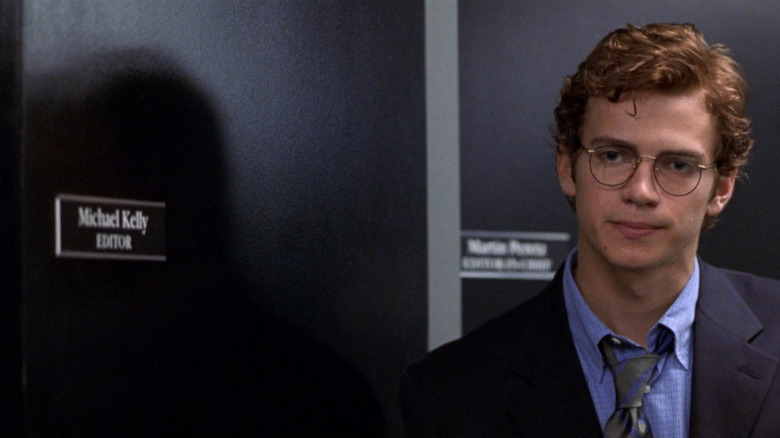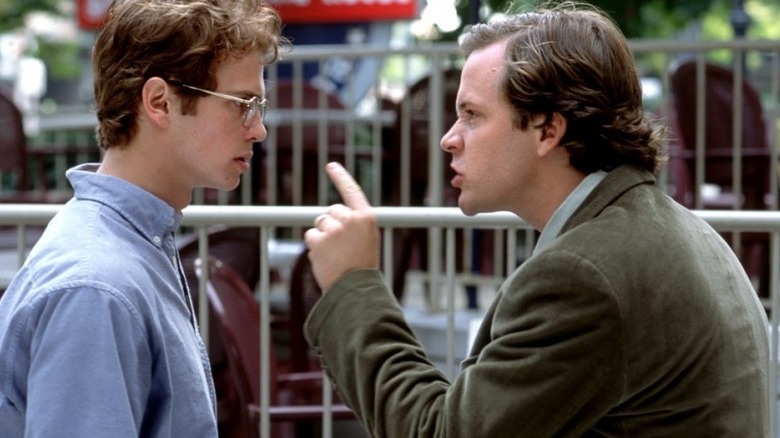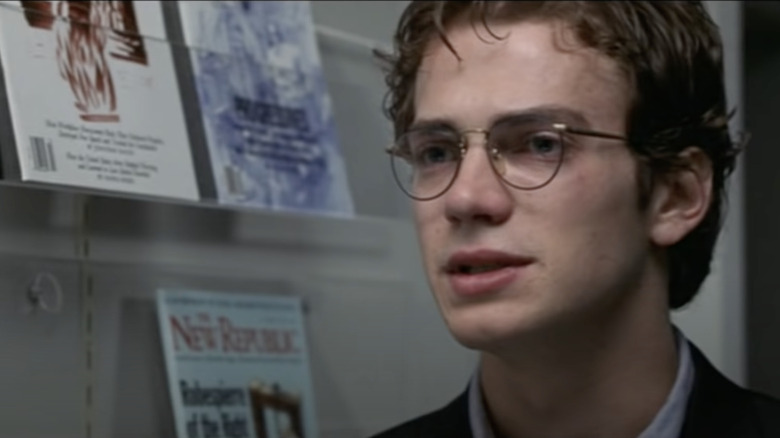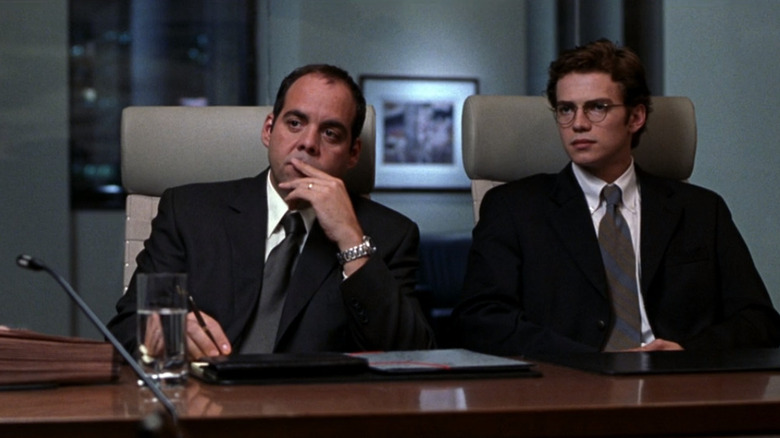Daily Stream: Shattered Glass Is A Brilliantly-Acted Depiction Of A Journalist's Worst Nightmare
(Welcome to The Daily Stream, an ongoing series in which the /Film team shares what they've been watching, why it's worth checking out, and where you can stream it.)
The Movie: "Shattered Glass"
Where You Can Stream It: Amazon Prime (via Freevee Channel), Tubi, YouTube
The Pitch: In 1998, 25-year-old New Republic editor Stephen Glass was exposed as a fraudster. Forbes reporter Adam Penenberg discovered that Glass' piece "Hack Heaven," about supposed software company "Jukt Micronics" paying off a teenage hacker, was fabricated. Of the 41 pieces Glass wrote during his three years working at The New Republic, 27 are now known to be made up in part or whole. The damage didn't stop at one publication; Glass later confessed to fabricating an article he wrote for Harper's. Needless to say, this was the end of Glass' career in journalism.
"Shattered Glass" is the title of both a Vanity Fair piece documenting the scandal and a 2003 film dramatizing it. Directed by Billy Ray, the first 30 minutes of the film establishes who Glass (played by Hayden Christensen) is, or rather, who he wants people to think he is; everybody's best friend and totally self-effacing about his rising star at The New Republic. After he writes "Hack Heaven," the subsequent hour shows the house of lies crumbling. Peter Sarsgaard co-stars as Charles Lane, the TNR editor who fired Glass, while Steve Zahn plays Penenberg. Chloe Sevigny and Melanie Lynskey round out the supporting cast as composite characters Caitlin and Amy, two of Glass' friendly co-workers at TNR.
Why it's essential viewing
The results of journalism can be exciting, but the work itself is not. The day-to-day grind is a grueling mix of phone calls, emails, and research, and whether all your effort will be fruitful is 50/50 at best. It's almost a miracle that there's a canon of great movies chronicling the grunt work of journalism, from "All The President's Men" to "Zodiac," from "The Insider" to "Spotlight."
Making a good movie about journalism? Well, it's a lot like the job itself. Find a compelling angle, structure the details properly, and people will care about your story. It's thanks to Ray's success at doing this that "Shattered Glass" sits comfortably beside the aforementioned movies.
Said movies are all about reporters investigating external institutions, from the White House to Big Tobacco. This time, though, the calls are coming from inside the house. Penenberg and the Forbes team are the first to unravel Glass' lies, but they're only prominent in the film's middle portion. In the third act, Lane becomes the hero as he turns over stone after stone, culminating in him going through old TNR editions one by one and realizing how deep Glass' rot has grown.
"Shattered Glass" is efficiently paced and you never feel like it's skimping on detail despite the tight 90-minute runtime. It can be a stressful watch, though, especially if you're a writer. The story plays on a fear unique to journalists, that you'll get a story wrong and your errors will be laid bare for the world. Of course, as the characters learn, Glass wasn't duped, he was malicious.
That brings us to the central character and performance of "Shattered Glass."
The snapshot of an alternate career for Hayden Christensen
A shadow spans over Christensen's career — Darth Vader's shadow. When people doubt his acting ability thanks to the "Star Wars" prequels, "Shattered Glass" is the go-to rebuttal, and with good reason. Watching the film, I started thinking it was a mistake to put this guy in a blockbuster franchise; he feels much more at home in this grounded drama and that's the type of movie he should've spent his career making.
Now as for Glass himself. The aforementioned Vanity Fair article mentions his people-pleasing began with his parents. The film touches on that in one scene, enough to explain Glass without excusing him. Simultaneously self-aggrandizing and self-pitying, he deploys "Are you mad at me?" as a reflex whenever anyone questions him, deliberately so no one actually does get mad at him. Except for Chuck, that is. Glass' puppy dog eyes that give way to petulance are perfectly contrasted with Sarsgaard's stone-faced Lane. Christensen walks a narrow tightrope in the scene where Lane fires Glass; the tears are real, but it's not out of remorse like Glass claims, it's because he can't bear to reap what he's sown.
Then there's the film's framing device, Glass giving a lecture to the journalism class at his old high school. In the final scene, it turns out this was all a daydream. Glass' greatest fantasy is being able to speak about how great he is (with some false modesty of course) as people nod along.
Postscript
The film ends while the real Stephen Glass' story continued. It speaks to the power of the story that once the credits roll, you still want to know more.
Despite graduating Magna Cum Laude from Georgetown Law School, Glass has twice been denied a law license, first in New York in 2004 and then in California in 2014. Instead, he works as a paralegal for the firm Carpenter & Zuckerman. In 2021, he was the subject of a harrowing piece in Airmail, chronicling his redemptive quest to always tell the truth and how it failed. Not because he lapsed, but because his wife Julie Hilden was diagnosed with early onset Alzheimer's (she passed in 2018). Glass complied with her desire to keep the disease secret from their loved ones.
The profile of Glass paints the portrait of a man who knows he screwed up, big time, and has never forgotten the cross he carries even while rebuilding his life. Is that the real Stephen Glass, or is it the two-faced sociopath of the film and the real Charles Lane's testimony? Journalism relays facts, while filmmakers conjure emotions. Yet both are imperfect, for only the audience can decide what they think or feel. Watching or reading about a true story is like looking at it through, well, shattered glass.



